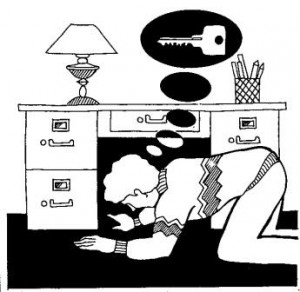Unit 13. Present perfect. I have done. Part one.
A.

Tom: Have you heard from George? Ann: No, he hasn’t written to me lately.
“He has lost his key” means that he lost it a short time ago and he still doesn’t have it.
This is the present perfect (simple) tense:
I/we/they/you have (= I’ve, etc.) lost
he/she has (= he’s, etc.) lost
I (etc.) haven’t lost
he/she hasn’t lost
have you (etc.) lost
has he/she lost
|
We form the present perfect with have/has + the past participle. The past participle often ends in -ed (opened, decided), but many important verbs are irregular (lost, written, done, etc.). See Appendix 2.
B.
When we use the present perfect, there is a connection with the present:
I’ve lost my key. (= I don’t have it now.)
Jim has gone to Canada. (= He is in Canada or on his way there now.)
C.
We often use the present perfect to give new information or to announce a recent happening:
I’ve lost my key. Can you help me look for it?
Did you hear about Jim? He’s gone to Canada. You can use the present perfect with just (= a short time ago):
“Would you like something to eat?” “No, thanks. I’ve just had lunch.”
Hello, have you just arrived?
Use the present perfect with already to say something has happened sooner than expected:
“Don’t forget to mail the letter.” “I’ve already mailed it.”
”When is Tom going to start his new job?” “He has already started.” Note that you can also use the simple past (I did /I lost, etc.) in the above situations.
I lost my key. Can you help me look for it?
“Would you like something to eat?” “No thanks. I just had lunch.”
“Don’t forget to mail the letter.” “I already mailed it.”
D.
Study the difference between gone to and been to:
Beth is on vacation. She has gone to Italy. (= She is there now or she is on her way there.)
Tom is back from his vacation. He has been to Italy. (= He was there, but now he has come back.)
(See also Unit 114.)
For the present perfect see also Units 14 – 19.
For the present perfect and simple past see Units 19 – 20.




